But I can see a lot of life in youSo I'm gonna love you every day
Last active 60 minutes ago
Don't wanna be here? Send us removal request.
Text
i've said before i love the way mccoy and spock take care of kirk. but the way kirk looks out for spock when his father is not only the first suspect in a murder case but also has jist had a heart attack. its slightly different the way kirk does it, he's more direct and more soft spoken- it's a tone of voice he rarely has- but he understands the topic is not up for discussion and he let's it go, hopefully letting him know hes there if spock need him
41 notes
·
View notes
Text
i'm watching Star Trek while I am working and I just got to Journey to Babel (s2 e10) and I'm absolutely losing it at the fact that Sarek is beefing with his son cause he chose to join Starfleet instead of the Vulcan Science Academy.
Sir. Maybe if your people hadn't been so shitty to him while he was growing up hw might have had more of an interest in staying there HELLO???????
crying. turns out being a petty parent is NOT unique to humans.
#not sarek being surprised when spock doesn't want to spend the rest of his life in a place where people constantly bully him#like#what#star trek tos 2x10#journey to babel
52 notes
·
View notes
Text
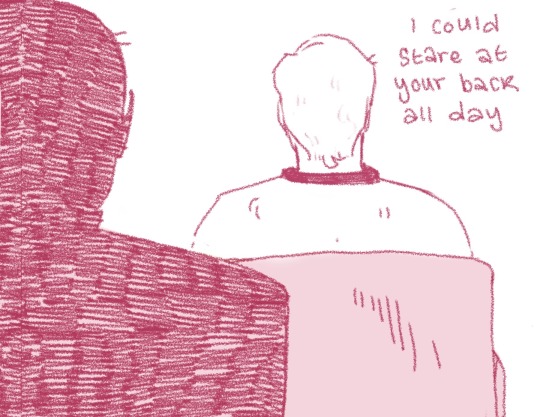
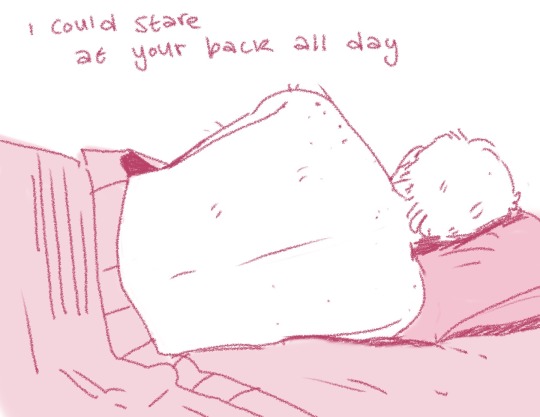
mr spock glows pink in the night in his room btw
2K notes
·
View notes
Text
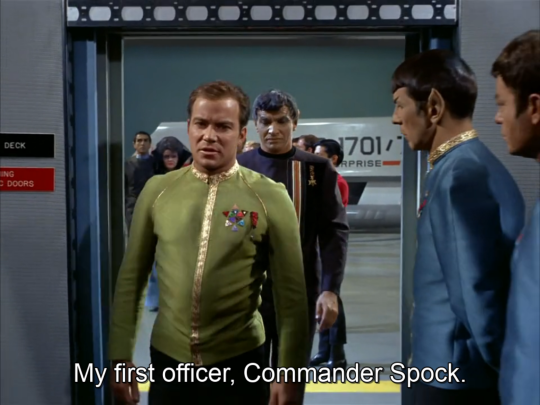
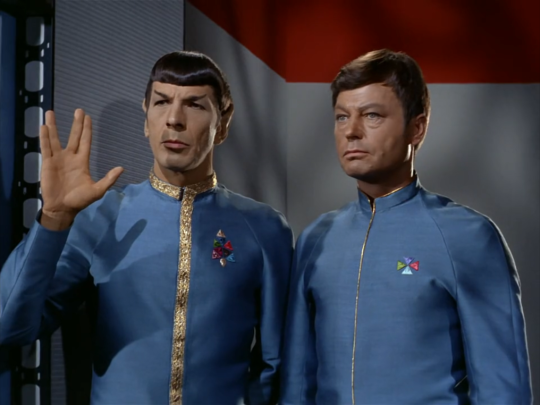
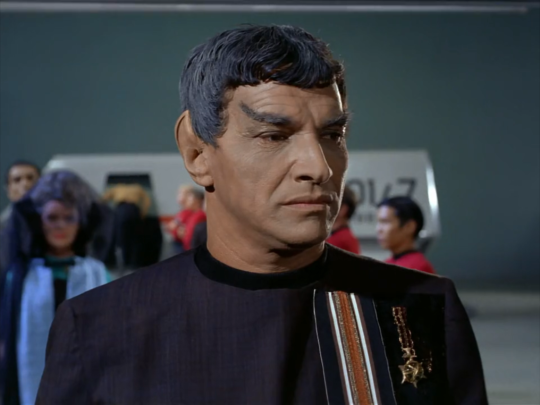
remember when Jim introduced Spock to his own parents lmao we stan a legend
#and then Kirk went all around the ship chasing spock threatening him with sarek and amanda#because revenge#star trek tos 2x10#journey to babel
70K notes
·
View notes
Text
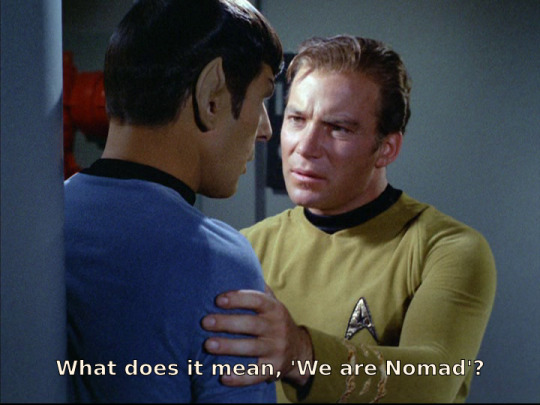
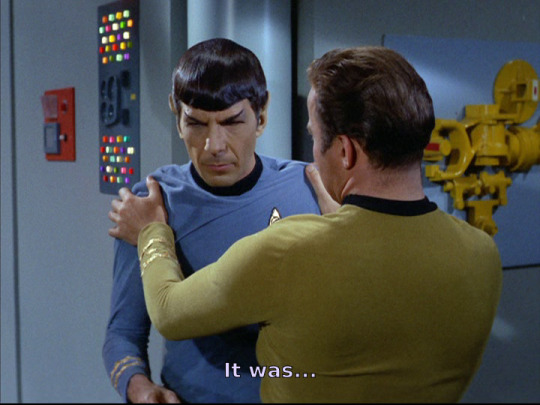
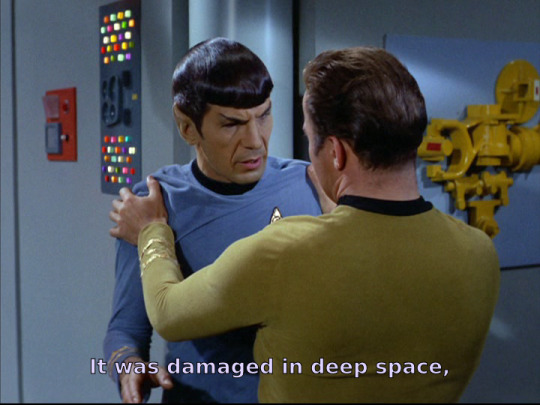
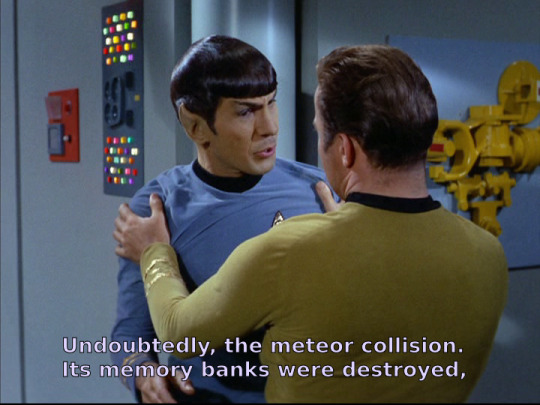
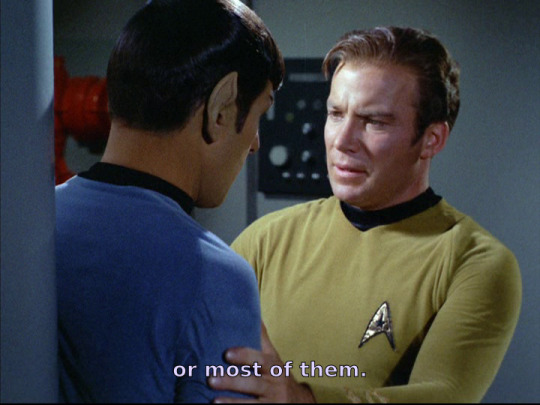
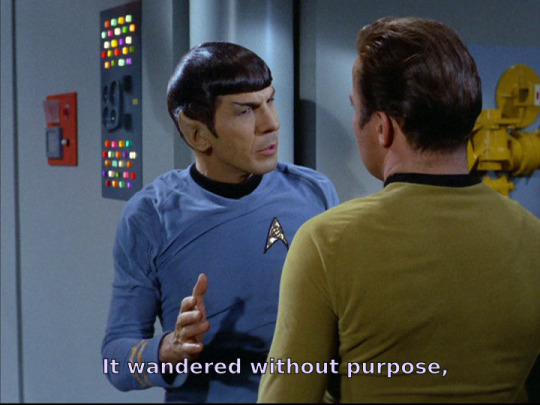

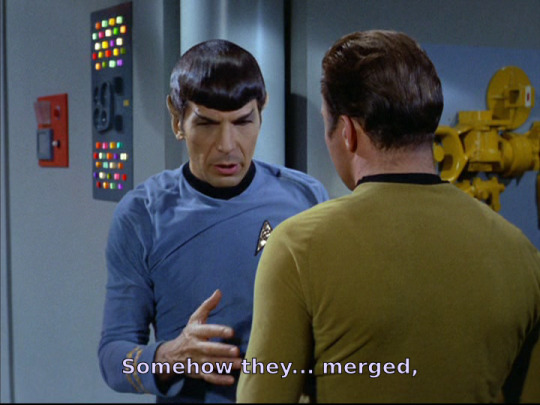


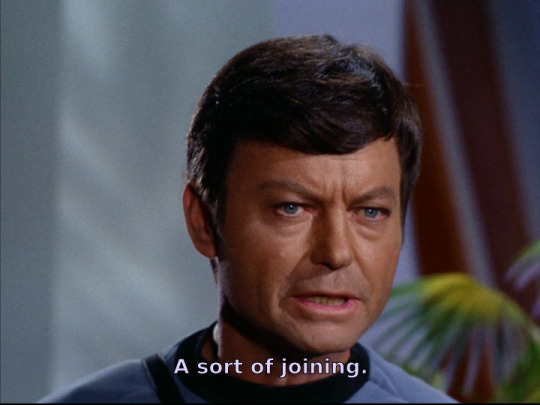
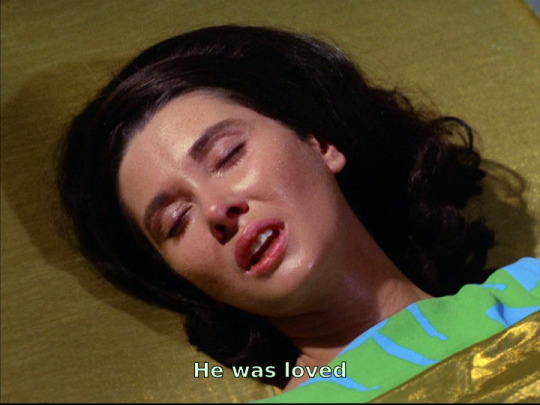
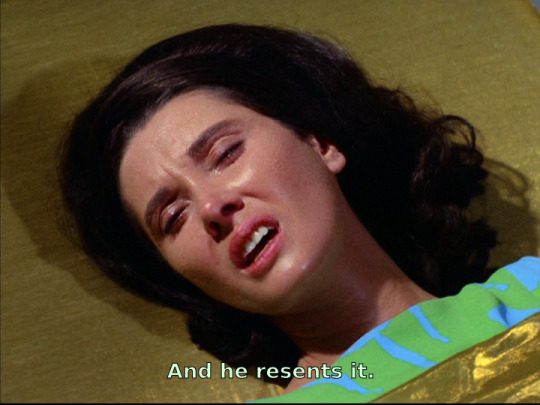



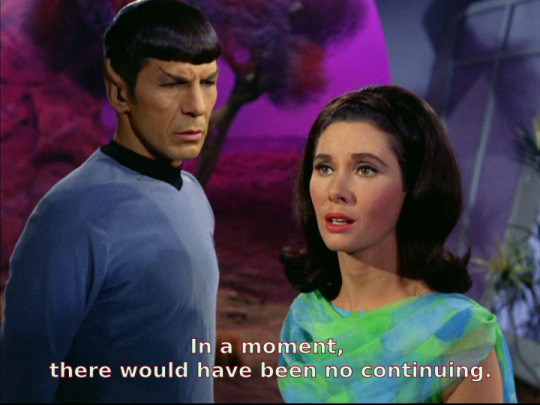

big fan of airing order putting these right next to each other. i think that sad little drone is in itself a tragic romance more compelling than a lot of the plots intended to be read as such in this series
#can't you see?#we've got to risk implosion#star trek tos 2x3#the changeling#star trek tos 2x9#metamorphosis
63 notes
·
View notes
Text
zephram cochrane in metamorphosis is a weak ass bitch. if i found out a telepathic gaseus alien being was in love with me i would simply love and cherish it in return send post
36 notes
·
View notes
Text
one thing about Jim is he is gonna have the time of his LIFE doing a little skit during a mission. He is going to do undercover espionage and put his WHOLE ASS into the costume alone (facial reconstruction surgery). He is going to commit to the bit so hard and loop so many people into his little improv theater production that it breaks down a functioning society of androids
And he’s gonna sit there while it happens like this
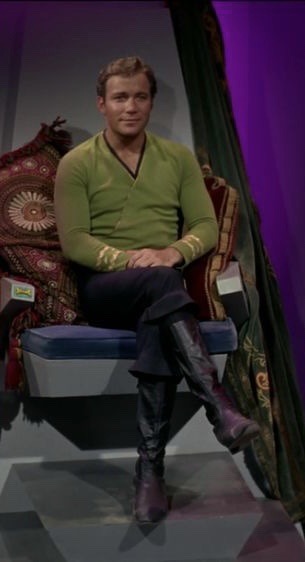
#he was so satisfied getting petty revenge on mudd and the androids#just how much time did they spend planning all that?#did spock come with his own ideas or did he just accept the other's recomendations#star trek tos 2x8#i mudd
5K notes
·
View notes
Text
Something about how Jim became so accustomed to Starfleet parlance that it’s the only parlance he can speak at all. Something about how his relationship with his ship and his work as Captain extends to language as well, to the way he handles and expresses his emotions.


Amok Time – Kirk is confronted with the fact Spock keeps a dangerous secret that, if not shared, might end up with his first officer killed

The Apple – With the landing party marooned on a strange planet and the USS Enterprise being pulled ever closer to the ground, Kirk asks Scotty something beyond excellence.


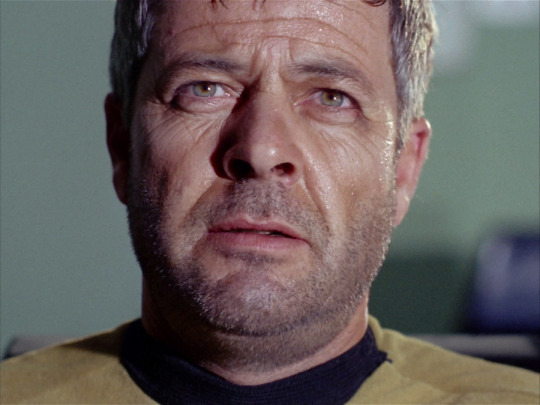
The Doomsday Machine – Commodore Matt Decker stands in the maw of a monster with a dead crew and stripped of any will to live. Kirk tries to bring his old friend to reason, but nothing else can be done for Decker as he looks death in the eye.
I understand how, especially in the third instance with Matt Decker, he might've seemed cold (your buddy is about to off himself, and you remind him the higher-ups spent too much money on his formation), but I see it more as Kirk trying to ground both himself and his friend (who is also a Commodore, might I remind you) than simply reducing Decker to his position.
It also accidentally reveals a lot about Jim (although reveal is not the best word, as that same thought has been explored in numerous episodes before), how much his sense of worth is tied to his job—to how well he can perform and excel at it.
But that's not all he's saying. In both instances (Amok Time and Doomsday Machine), Kirk puts himself in the Federation's place because he sees its recognition as more valuable, more "worth living for" than his own.
It's his way, the way of a man who knows no life other than that of servitude, of saying I care about you, and I don't want to lose you.
It's really tragic that it is not enough to save Decker. If both Matt and Jim share the belief (which appears more often than not in Starfleet overachievers) that your inner worth is tied to how well you can perform it, Matt is left face to face with the rather morbid fact that he failed severely and his whole crew is dead because of it.
To sin is human, yes, but if the Doomsday Machine is the Devil, as the Commodore himself put it, it truly is a shame Decker did not view himself as deserving of forgiveness
#what the hell op#what do you mean#'It's his way the way of a man who knows no life other than that of servitude of saying I care about you and I don't want to lose you'#i die#star trek tos 2x6#the doomsday machine#does everyone think that Jim is just indifferent like that#that his crew only matter because of their utility#when he cares#so so much
166 notes
·
View notes
Text
Actually so funny that McCoy gets so mad in "The Doomsday Machine" that Jim isn't in charge and Spock hasn't just fixed everything that when Decker tells him to leave the bridge he just leaves the whole episode.
#star trek tos 2x6#the doomsday machine#honestly i do not blame him#i would have done the same#i was just wondering how spock handles it
49 notes
·
View notes
Text
Adam, Spock, and Eve -- an Analysis on The Apple from TOS
“The LORD God took the man and put him in the garden of Eden to till it and keep it”, in a promised vow Adam and Eve swore to allow themselves to remain blissfully unaware of the nature of sin or face divine punishment for eating the apple that would give them this knowledge. Star Trek season 2 episode 5, "The Apple", captivates viewers with its exploration of these themes of autonomy and the consequences of blind obedience in the face of authority; or so the episode tries to sell. I would argue that it does tackle these topics in an interesting manner, though not how the writers initially intended. The crew of the Starship Enterprise continually demean the autonomy and personhood of the people of Vaal, denying them the freedom of choice and posit themselves as white-knighted heroes who would fix the unjust systems of Gamma Trianguli Six. However, the landing party fails to acknowledge that they have been here for less than a day, and their understanding of the culture of this small part of the planet is flawed. Ursula K. Le Guin’s essay, American Sci-Fi and the Other tackles these themes, highlighting how limits in our perspective leads to the alienation and dehumanization of people and practices we do not understand, which results in a denial of their autonomy.
Le Guin outlines 4 forms of alienation that have become popular in contemporary Science Fiction – the sexual alien, the social alien, the cultural alien, and the racial alien. Though each comes from a similar vein of popularized ignorance, their manifestations vary greatly in Sci-Fi. The sexual alien in The Apple takes the form of the narrative treatment of female characters like Yeoman Martha Landon. Landon’s 14 lines throughout the hour long episode quickly characterize her as a character whose femininity undercuts her competence as an officer of the Starship Enterprise. Chekov and Landon share a brief, intimate encounter early in the episode,
MARTHA: All this beauty, and now Mister Hendorff dead, somebody watching us. It's frightening.
CHEKOV: Martha, if you insist on worrying, worry about me. I've been wanting to get you in a place like this for a long time.
The conversation gets interrupted by Kirk returning and asking them to not “conduct a field experiment in human biology”. Landon is one of the only characters regularly referred to by her first name rather than her title. While this could be attributed to her low rank as a red shirt, the four other redshirt officers are still often only referred to by their last names as a sign of respect.
"KIRK: Mallory! Marple, stand back! Watch it! The rocks! (kneeling by the body) Kaplan. Hendorff. I know Kaplan's family. Now Mallory.”
Yeomen in The Original Series are often almost exclusively young women, with a notable exception being the season 1 episode The Cage, where the male Yeoman is killed to show the competency of the villain of the week. Their role is to dutifully fulfill the petty orders given by their captain, such as light administrative work or ensuring the wellbeing of the captain and his surrounding male officers. These female Yeomen are often treated by the narrative to have the sole imperative goal to be “an object of desire for the surrounding men.” This is seen especially in The Apple, when Landon voices her concerns for the Starship she is told to be quiet and sit down by Kirk, or silenced by Chekov’s seductions. Her views, questions, concerns, and opinions are constantly used as punchlines for men, as though she’s too stupid to understand the complexities of what is going on around her.
“MARTHA: But these people, I mean, if they don't know anything about. What I mean is, they don't seem to have any natural– er. I mean, how is it, done?
KIRK: Mister Spock? You're the science officer. Why don't you explain it to the young lady.”
She is alienated from the rest of the cast for being a woman, and as Yeomen often are, the women of Starfleet “are also assigned a sexed identity in their professional lives, based on their supposedly “innate��� qualities” of “modesty, sweetness, fear, shyness, compassion, [and] languor.”
The social alien is one that focuses on class and hierarchy, specifically, on the lower ranks of it. This form of alienation has many reflections throughout the episode – from Kirk’s treatment of Scotty as they struggle to pull the Enterprise from the tractor beam, to the Vaalian’s role of feeding Vaal. Those who are not leading men are treated as “masses, existing for one purpose: to be led by their superiors.” Those in the Starfleet are under threat of losing their jobs – their financial security and role on the ship – if they do not listen to their superiors. The Vaalians, however, must actively choose to listen to Vaal for their instructions. There is no threat of violence as they do not know what it means to kill, nor incentive for greed as they are already provided everything they need for a happy and healthy life. As the Vaalians go to feed Vaal – their sole role in exchange for eternal life and long lasting prosperity – Spock notes that in his view, this is “a splendid example of reciprocity”.
This point of view, however, is heavily contested by Captain Kirk and Chief Medical Officer McCoy, and is a prime example of the alienation of the Vaalians and S'Chn T'Gai Spock as Racial and Cultural Aliens. Multiple times throughout the show, Spock’s vulcan lineage has placed him in an uncomfortable position in relation to Starfleet.
“MCCOY: Negative. Did you know this is the first time in a week I've had time for a drop of the true? Would you care for a drink, Mister Spock?
SPOCK: My father's race was spared the dubious benefits of alcohol.
MCCOY: Now I know why they were conquered.”
Many of his conversations with McCoy end with a quip from McCoy about how vulcan biology is inferior to human biology, how their culture is strange and alien to him. He complains about how Spock has green blood, and a heart closer to his abdomen than his chest, even after Spock nearly died protecting them from the deadly flora of Gamma Trianguli Six. McCoy also overdoses Spock, in a blind attempt to get him to wake up from the poisoning. While these could be read as light-hearted quips to maintain the lighthearted tone of the series in face of the Hamlet-ian deaths of the redshirts, McCoy’s refusal to learn about vulcans speaks to a larger theme throughout the episode of doxastic ignorance about other people and cultures.
The Vaalians are repeatedly noted to be happy and healthy, as explained by McCoy, as he cannot tell if they have been around for “twenty years, or twenty thousand years”... “add to that a simple diet, a perfectly controlled temperature, no natural enemies, apparently no vices, no replacements needed”. Their only natural exchange for this is the gifting of some excess fruit to Vaal each day. McCoy takes issue with this manner of living, and that the Starship must intervene, stating that their society is stagnant, and needs something to strive for. However, Spock states in the episode that the Vaalians, as any other group of people, reserve the right to choose a system that works for them. This argument continues throughout the episode, and exemplifies their alienation of the Vaal due to their ignorance, as the human crew of the Starship attempt to overthrow the system of Vaal. They eventually settle on a final course of action, with the Starship trapped in Gamma Trianguli Six’s atmosphere – to kill Vaal. This response could be predicted by LeGuin’s explanation that “[t]he only good alien is a dead alien”, especially in the context of racial and cultural alienation. The Starship landing party alienates and subverts the autonomy of an alien community because their ignorance leads them to believe they are superior . Le Guin’s essay outlines precisely in each area how this episode creates divides in its cast, both between the Starship Enterprise and Vaalians, but within the Starship as well. At the end of the episode, Spock, McCoy, and Kirk ruminate on the consequences of killing a being who was providing for an entire community of people, and the starship leaving that community with nothing but their own wits.
SPOCK: Captain, I'm not at all certain we did the correct thing on Gamma Trianguli Six.
MCCOY: We put those people back on a normal course of social evolution. I see nothing wrong in that.
KIRK: Well, that's a good object lesson, Mister Spock. It's an example of what can happen when a machine becomes too efficient, does too much work for you.
SPOCK: Captain, you are aware of the biblical story of Genesis.
KIRK: Yes, of course I'm aware of it. Adam and Eve tasted the apple and as a result were driven out of paradise.
SPOCK: Precisely, Captain, and in a manner of speaking, we have given the people of Vaal the apple, the knowledge of good and evil if you will, as a result of which they too have been driven out of paradise.
KIRK: Doctor, do I understand him correctly? Are you casting me in the role of Satan?
SPOCK: Not at all, Captain.
KIRK: Is there anyone on this ship who even remotely looks like Satan?
(McCoy and Kirk walk around Spock. McCoy is gazing intently at Spock’s pointed ears.)
SPOCK: I am not aware of anyone who fits that description, Captain.
KIRK: No, Mister Spock. I didn't think you would be.
This is not to say all of Star Trek treats its nonhuman, lower class, and female characters with this lack of respect throughout the entire series, but The Apple speaks deeply to both Le Guin’s thoughts on Alienation and Patriarchal White Supremacy, and Star Trek’s need to appeal to the larger American audience in its messaging. Landon’s alienation stems from her role in patriarchal systems that would create a divide between her and the leading male cast; The Vaalian and Spock’s alienation is due to being foreign to a capitalist system that pushes for constant productivity, and being denied agency by those who believe their own views are the ‘correct’ ones. Considering the episode was released in America during the Cold War, it’s not hard to infer that this episode was cautioning Americans against communism. However, it treats everyone who isn’t coded as a Red Blooded American Man as mindless and abused, in need of a push in the right direction. This episode tries to speak for a better, more unified divine future – to take people from a corrupted garden and give them true Eden – but it regresses directly back into idealizing colonization in its efforts to homogenize any culture it can touch.
Works Cited under the cut
Boquet, Damien, et al. “Editorial: Emotions and the Concept of Gender.” Clio. Women, Gender, History, no. 47, 2018, pp. 16. JSTOR, https://www.jstor.org/stable/26934334. Accessed 10 Apr. 2024.
Hulshult, Rachel. “Star Trek: What Is a Yeoman & Why Did They Disappear from Starfleet?” ScreenRant, 4 Aug. 2023, screenrant.com/star-trek-yeoman-rank-disappear-why-explained/.
Le Guin, Ursula K. “American SF and the Other.” Science Fiction Studies, vol. 2, no. 3, 1975, pp. 208–10. JSTOR, http://www.jstor.org/stable/4238969. Accessed 10 Apr. 2024.
Pevney, Joseph. Star Trek. 13 Oct. 1967, episode 31. TV Series Episode. The Apple.
Trivers, Barry. Star Trek. 8 Dec. 1966, episode 13. TV Series Episode. The Conscience of the King.
Vatican. “The Book of Genesis.” Www.vatican.va, www.vatican.va/archive/bible/genesis/documents/bible_genesis_en.html. Genesis 2:15.
#even spock being known and useful can't make him less of an alien#even women being human can't make them less of an alien#star trek tos 2x5#the apple
13 notes
·
View notes
Text
SPOCK DOESNT LOOK LIKE SATAN WHY ARE THEY SO MEAN TO HIM LET ME THROUGH THE FUCKING SCREEN IM GONNA BEAT THEM UP
54 notes
·
View notes
Text
As @gunstreet once said, The Apple is Spock’s Terrible, Horrible, No-Good, Very Bad Day.
2K notes
·
View notes
Text
Was just watching the first mirror-verse ep in DS9 and I thought it was interesting how the course of events were changed bc of Kirk + co’s visit in “Mirror, Mirror”.
Mirror Kira says how after Kirk talked with mirror Spock, he became a whole different person and rose in the ranks to create something new for the world, which before he never would have. Mirror Spock was like “I just enjoy working in the science department, I don’t want to be a captain” but Kirk changed all of that!!!?!
In every timeline and universe, Kirk and Spock affect each other. In every way. No matter which Kirk and Spock they are.
#obsessed#and they were t'hy'la#do we think mirror!Kirk was jealous that spock was willing to sacrifice everything for an idea that came from another Kirk#a better Kirstar#star trek tos 2×4#mirror mirror
76 notes
·
View notes
Text
Watching Mirror, Mirror for the first time is an experience that is so fucking hilarious and awesome.
Like the costumes for the mirror universe are so cool to look at and the fact that the og landing party is just in Kirk's quarters going "I wonder how alternate us is doing" and it cuts to Shatner screaming bloody murder as he's being dragged by red shirts.
Mirror!Kirk's threats are also so fucking funny because Spock is just so unbothered with this man that isn't his Jim. Like he knows this ain't his husband and therefore he does not give a fuck.
Shoutout to Kirk's look of horror when he realized that Spock would have to deal with evil versions of the landing party without him. Truly iconic homosexual behaviour.
403 notes
·
View notes
Text
thinking about tarsus and the mirror universe, and wondering in what ways the events may or may not have differed between the two. how can an already nightmarish situation have been twisted even worse - and what kind of effect would that have on young james?
our jim likely came out of tarsus with an even deeper sense of compassion for his fellow man - kindness forged in fire. he’s been through such hardship and pain that all he wants to do is alleviate that in others - his idea of “let me help” perhaps being even more romantic than “i love you” being cultivated there
and what the mirror image of that must be. any sense of trust or heart mirror!kirk may have possessed as a child completely shattered - kindness quite literally starved away. he’s been through such hardship and pain, so why should everyone else get off easy?
#mirror!Kirk probably belongs to the enterprise just as og!Kirk#but tarsus taught him to claw his way out stepping over anyone and everyone#or the world is going to eat him alive#so he is still a competent captain he does ensure that the enterprise survives#because it is his reign and his power#not because of his crew#his competence is why Spock follows him his indiference towards everyone is why Kirk is able to remain in command#i think Spock tried to convince him to change their world#but couldn't compete with his indiference and apathy#because why should everyone else get off easy#star trek tos 2x4#mirror mirror
166 notes
·
View notes
Text
Thinking about AOS Mirror!Verse Spirk is fucking me up a little because, canonically, in the prime Mirror!Verse, Spock killed Kirk, tried to reform The Empire, and caused the fall of The Empire in doing so by weakening it to invading parties. This man must regret basically every single thing he did with his life. He thought he was doing the right thing, the logical thing, ensuring the longevity of his world, and all he got was a dead soulmate and a legacy of failure.
And now he’s been granted the chance to tell his younger self to not do any of that. That there’s no saving The Empire from itself, but The Empire doesn’t matter. That killing Kirk would feel like killing himself. That he would regret it every day of his life. That his life will feel so, so content if he just follows this man and his trail of bloodshed through the galaxy.
Torture for him.
Kill for him.
Die for him.
And he will, and he does, and this time when The Empire burns itself out, Spock regrets absolutely nothing.
#loving the miserable kind of vibe you bring to the function#keep it coming op#star trek tos 2×4#mirror mirror
175 notes
·
View notes
Text
oh mirror spock i think of you constantly....... how jealous do you think he was of og spock for having an actual useful, reliable and cute jim kirk. that one talk og jim and mirror spock had before jim went back to og universe..... oh i know mirror spock thinks about it every night. maybe sometimes he gets slightly satisfied that at least, in another universe, he got to have a jim he could love (and one that could love him back)
#did he take comfort in the fact that maybe in another universe they could be safe together?#did he find himself dreaming and longing#illogical as it may be?#star trek tos 2×4#mirror mirror
282 notes
·
View notes